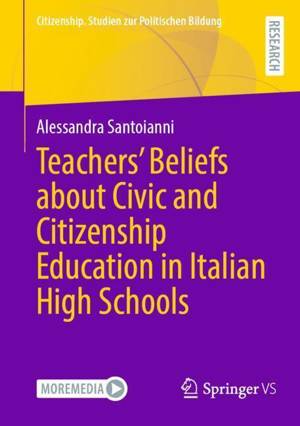
- Retrait gratuit dans votre magasin Club
- 7.000.000 titres dans notre catalogue
- Payer en toute sécurité
- Toujours un magasin près de chez vous
- Retrait gratuit dans votre magasin Club
- 7.000.0000 titres dans notre catalogue
- Payer en toute sécurité
- Toujours un magasin près de chez vous
Teachers' Beliefs about Civic and Citizenship Education in Italian High Schools
Alessandra SantoianniDescription
Various social and political actors are responsible to educate citizens to sustain democracy. Civic and Citizenship Education (CCE) addresses this issue and has gained prominence. Italy made the subject compulsory in schools with the law n.92/2019.
Different conceptualisations of CCE have the notion of citizenship at the centre, which can differentiate between traditional and critical approaches. Despite this, little is known about what teachers believe in terms of citizenship and what the subject should involve in terms of goals, content and methods.
This work aims to understand Italian teachers' views on CCE and its implementation and contribute to its systematisation as a scientific discipline. The author interviewed Italian high school teachers and analysed the results. The results show that teachers' beliefs about the goals of CCE relate to broad social and political issues and students' learning. These beliefs also show civic republican values. Three macro-areas of content from the 92/2019 law serve as a framework for teachers to select topics they believe are relevant, and Lawfulness Education is the key to the content, goals and teaching strategies. Teachers are unclear whether CCE should be a separate, transversal or integrated subject. Ultimately, they implement what they believe in despite the policy changes introduced by the 92/2019 law.
Spécifications
Parties prenantes
- Auteur(s) :
- Editeur:
Contenu
- Nombre de pages :
- 193
- Langue:
- Anglais
- Collection :
Caractéristiques
- EAN:
- 9783658464950
- Date de parution :
- 19-11-24
- Format:
- Livre broché
- Format numérique:
- Trade paperback (VS)
- Dimensions :
- 148 mm x 210 mm
- Poids :
- 281 g

Les avis
Nous publions uniquement les avis qui respectent les conditions requises. Consultez nos conditions pour les avis.






